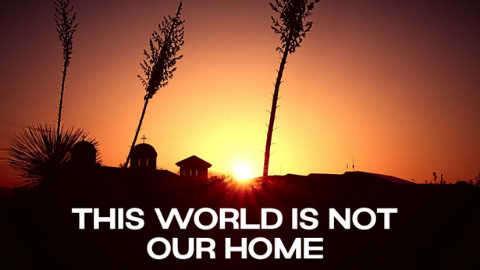“Many lose their true home because they have greater love for the road that leads them there. Let us not love the road rather than our home, in case we should lose our eternal home … Let us keep to this principle, therefore, that we should live as travelers and pilgrims on the road … free of lusts and earthly desires, but let us fill our mind with heavenly and spiritual forms,” St. Columbanus.
“Do not love the world or the things in the world. If anyone loves the world, the love of the Father is not in him” (1 Jn. 2:15). True Christianity is a renunciation of the ways of the fallen world. A Christian is one who has been chosen out of this world. Like our Master, we must be “not of this world” (cf. Jn 15:19). This fallen system of the world is not our home, “For here we have no abiding city, but we seek the one to come” (Heb. 13:14). Since this is the true state of things for a Christian, he must be ever ready to flee from this world, as Lot did from Sodom. By fleeing from the fallen world a person is freed from the desire for the world. For the Christian, authentic flight from the world is a running to Christ Jesus. To know Christ in Truth, the heart must be freed from bondage to sin and the world. This freedom makes room in the heart for the Holy Spirit to dwell, for if a man’s heart is already full then there is no place in it for the Holy Spirit. The heart must be single and undivided, serving but one master (Cf. Matt. 7:24). “The Spirit,” St. Basil the Great teaches, “does not take up His abode in someone’s life through physical approach; how could a corporeal being approach the Bodiless one? Instead, the Spirit comes to us when we withdrawal ourselves from evil passions, which have crept into the soul through its friendship with the flesh, alienating us from close relationship with God.”[1]
Grace is a gift of God; it is only received by those who respond to Him. When the inner heart of man responds to the calling of divine grace, he rises up seeking the One who has touched him; then the Spirit lifts the heart upward. The Holy Spirit, seeing the response and effort of the believer, then sends even more grace: “For whenever the Lord sees anyone courageously turning away from the pleasures, distractions, the crass cares and worldly ties, from the preoccupation of vain reveries, He gives him His special help of grace and protects the soul that unwaveringly journeys courageously through the present corrupt world,” teaches St. Macarius.[2] St. Macarius the Great, The Fifty Spiritual Homilies ,4. 4, p. 51.))
To abide in the grace of the Holy Spirit the believer must continually strive to be divesting himself of love and attachment to the false pleasures of this world, otherwise, they will act as a ‘ball and chain’ preventing him from growing in the life of Christ.[3] St. Ignatius of Antioch even councils, “Do not talk about Jesus Christ while you desire the world.”[4] St. Gregory of Nyssa also teaches, “The love of God arises from what is opposed to carnal desire.”[5]
Sin opposes the grace of God. By indulging in sin, a man unites himself to that which is contrary to God and true life. Man can only be united in one union; thus it is impossible for him to seek and desire both the false pleasures of this world – sin – and God. St. Dimitry of Rostov teaches, According to the words of the apostle, the one who clings to the Lord is one spirit with the Lord, so, in a similar manner, the one who clings to demons is one spirit with the demons. An evil person is the same as a demon, for he who unites himself to demons becomes of one spirit with demons.[6]
The move away from sin simultaneously becomes movement towards Jesus Christ; entering the way of Christ entails the rejection of this fallen world and all its ways. Just as in a marriage it is impossible to be called faithful while engaging in intimate relations with another, so the soul that loves the world and is engaged with it, cannot become known to Christ. Christ cannot know the soul that loves the world. Love of the world is enmity with Christ the Lord (cf. James 4:4). The soul having professed unity and faithfulness to God in Holy Baptism and Chrismation has become a bride of Christ (cf. Eph. 4:22ff). As a bride sets herself apart exclusively for her beloved, so should the Christian soul be set apart and distinguished from the ways of the world.
St. Gregory Palamas instructs: “How do you think we can distinguish between believers and unbelievers, the illuminated and the unenlightened, that is to say, between those baptized as Christians and belonging to Christ, and those who are unbaptized and in the devil’s ranks? Is it not by their works? Is it not by their deeds? Is it not by their ways?” [7] And St. Macarius the Great teaches: “The world of Christians is of a special kind, their style of living, their thinking, their speech, and all their actions. That of this world is completely different. There is a great difference between them.”[8]
To flee from the mentalities and ways of the fallen world is a conscious choice, one that must be lived out daily.[9] Thus, the Apostolic command is to be “renewed in the spirit of your mind” (Eph. 4:23). This renewal is an energy of the Holy Spirit, but it also demands our active desire to not be conformed to the world, “And do not be conformed to the world, but be transformed by the renewing of your mind” (Rom. 12:2). The temptation of the world does not cease; therefore the believer must make a continued, active, and conscious commitment to Christ every day and every hour. St. Herman of Alaska reminds us, “For our good, for our happiness, let us at least make ourselves a vow: that from this day, from this hour, from this minute, we shall strive to love God above all and do His commandments.”[10]
For the believer, flight from the world in most cases does not entail a literal or physical withdrawal. The challenge for most true Christians is to live in the world but not be of the spirit of the fallen world.[11] The believer sets himself apart from the world by the manner in which he lives, reasons, and manifests the grace of the Spirit from within his heart. Saint Paisios of Mount Athos counsels:
Every day you should try to plant in your soul something spiritual, which will eject something worldly and sinful … Replace the sinful images in your mind with holy ones. Replace songs with hymns, worldly magazines with spiritual books. If you do not break away from all that is worldly and sinful, if you do not commune with Christ, with Panaghia, with the Saints, with the Church Triumphant, and if you do not place yourself completely in the hands of God, you will not acquire spiritual health.[12]
Thus, any form of Christianity that seeks to appease the fallen world and cultivate harmony and fraternity with it, is making itself an enemy of God, as the Apostle James clearly teaches. For in desiring to please men it ceases to be a servant of Christ (cf. Gal. 1:10) and furthermore ceases to be anything remotely Christian.
As believers in Christ, we must be convinced of the emptiness of the world so that we may progress in God. When the eyes of the heart begin to be opened by divine grace they perceive that which is true and real and that which is false and illusory. The Christian heart that becomes more and more aware of the fruitlessness of this fallen world, turns more ardently to God. Having been awakened by grace, a Christian must make a free decision to increase in grace, adding grace to grace.[13] By realizing the void of mortal worldly living, the soul progresses into repentance: “Repentance does not come readily to a carnal man; and none of us fathoms the problem of sin which is only disclosed to us through Christ and the Holy Spirit. The coming of the Holy Spirit is an event of supreme importance,” teaches St. Sophrony.[14]
By having the light of grace begin to shine in the heart, a person begins to understand in what darkness he was dwelling. Flight from the world is bound to repentance. Through repentance, the heart of man mourns his unfaithfulness and sin. Repentance is a gift of the Spirit bringing man to regeneration, turning him from darkness to light. Repentance is the renewal and continuation of baptism, an essential change, a turning from death to life, from non-being to being; “a contract with God for a fresh start in life … It is the purification of conscience and the voluntary endurance of affliction … Repentance is a cheerful renunciation of every creature comfort” as St. John Climacus preaches.[15]
The believer who seeks the Holy Spirit in his life is called to live continuously in repentance; this whole earthly life is given as an opportunity to repent. St, Clement proclaims, “While we are yet on earth let us repent. For we are clay in the Craftsman’s hand … While we still have time to be healed, let us place ourselves in the hands of God the Physician, and pay Him what is due. What is that? Sincere, heartfelt repentance … Let us wipe off from ourselves our former sins and be saved, repenting from the very souls of our being.”[16] The grace of the Spirit is given to those who seek it. Repentance is the seeking of grace and its acquisition. It is an active and willful flight from this fallen world. Just as a man once voluntarily chose the life of sin, so in repentance he voluntarily chooses life in God – “Voluntarily have I sinned before Thee, yet voluntarily do I also repent,” sings St. Issac the Syrian.[17]
Such a one gratefully submits his life in repentance to the Lord, knowing that he shall be raised up a son and heir of the Kingdom of Heaven. St. Symeon the New Theologian reveals: As many as have endured the corrections of their own Father and Master, like grateful servants and sons, say: ‘I will bear the Lord’s punishment because I have sinned before Him,’ and another key: ‘The sufferings of this present time are not worth comparing with the glory that is to be revealed in us’ [Rom. 8:18]. Thus … they abide their daily correction and constant penitence, not shying away from it or becoming annoyed by it, but, disciplined … they abide in the Father’s house, radiantly clothed, eating at the Father’s table, beholding His glory and the wealth which they will come to inherit.[18]
If Christianity ceases to call people to repentance it ceases to be truly Christian. The emerging repentance-less “christianity” is a false gospel. Its concern is for this world and the things of this world. It exploits Christian constructs but denies the essential Truth of Christ Jesus.
In repentance, a Christian comes to behold the perfect beauty and purity of God, while His light reveals the filthy darkness of his works of sin. Repentance is not a morbid fixation on sin, filled with gloom and despair. It is not legalistic appeasement of God. Repentance should not be reduced to emotional experience, intellectual concession, or mechanical change: it is the realization of truth. When we sin we fill our hearts with emptiness, darkness, and death. By repentance, man declares war on his own sin. Repentance is a deep cleaning; throwing wide the windows of our heart, letting the Son of righteousness shine in, which is placing our life in the hands of God. It is healing for the soul of man, therapeutic restoration; the complete renewal of man’s being: “Grant me, grant to this needy, grant to this wretch the grace to reject all perversity from my soul … Give me humility, give me a helping hand, purify the impurity of my soul and grant me tears of repentance, tears of regret, tears of salvation, tears which will dispel the darkness from my intellect and which will make me shine with heavenly brightness,” as proclaims St. Symeon.[19]
This fallen world is not our home. May we find the path to our true Fatherland through heartfelt repentance in Jesus Christ our Lord.
Originally posted on inklesspen.blog and at patrisicfaith.com

My name is Zechariah Lynch. I am an Orthodox Christian. I am an Orthodox priest. I have freely given myself to be influenced and guided by the Orthodox Faith: it is the main foundation upon which I will endeavor to base my thoughts and observations for this blog.
I believe in things like Truth, Goodness, and Beauty; that humanity is subject to higher principles. Ultimately I believe in God.
I will be mixing the proverbial “religion and politics.” I will also simply be reflecting on various issues of life. Sometimes everyday things; sometimes global events. An organic and cohesive philosophy spans all aspects of life. Everyone has a “philosophy” for life. But I am not a relativist, thus I do not think that all ideas are true and equal. Although ideas they may be.
My articles are my thoughts and opinions. Although, as stated above, I have diligently sought to guide them by the standard of Orthodox Christianity.
My writing credentials do not come from the fact that I have an M.Div, for instance. My credentials remain in the fact that I am striving to base my thoughts and way of life upon the Revelation of the Holy Trinity as given to the Eklessia. Or in the words of Fr. Seraphim (Rose), “Far be it from me to presume to speak for the Church; but I can at least speak of some of the things I think I have learned from Her.”
This Revelation is very objective. Humanity has not been left without standards. God revealed Himself by becoming Man. He left us the Church, His Body, as the “pillar and ground of truth” (cf. 1 Tim. 3:15); we have the testimony of Jesus Christ and the Apostles – the Scriptures. We have a two thousand year experience of Christian living and teaching (tradition). These are all very concrete and empirical.
References
| ↑1 | St. Basil the Great, On the Holy Spirit, 9. 23, p. 44. |
|---|---|
| ↑2, ↑3 | Cf. St. Gregory Palamas, The Homilies, 44. 9, pp. 351-352. St. Maximos the Confessor teaches: “As a little sparrow whose foot is tied tries to fly but is pulled to earth by the cord to which it is bound, so does the mind which does not yet possess detachment get pulled down and dragged to earth when it flies to the knowledge of heavenly things.” First Century on Love, 85,in The Philokalia, vol. 2, p. 63. “The prince of evil holds all people engrossed in earthly concerns. By these concerns he disturbs people, keeps them anxious and in a state of nervous motion. The result is that they are disturbed by vain thoughts and base passions and are in bondage to earthly attachments to this world. Satan constantly holds them as captives.” St. Macarius the Great, The Fifty Spiritual Homilies , 5. 2,p. 63. |
| ↑4 | St. Ignatius of Antioch, To The Romans, 7, in The Apostolic Fathers, pp. 104-105. |
| ↑5 | St. Gregory of Nyssa. Commentary on the Song of Songs, trans. C. McCambley, Brookline, 1987, p. 135. |
| ↑6 | St. Dimitry of Rostov, Instructions on the Path of Virtue, p. 14-15 |
| ↑7 | St. Gregory Palamas, The Homilies, 30. 11, p. 240. |
| ↑8 | St. Macarius the Great, The Fifty Spiritual Homilies, 5. 1,p. 63. |
| ↑9 | “Examine yourself daily in the sight of God, and discover which of the passions is in your heart. Cast it out, and so escape his judgments.” St. Isaiah the Solitary, On Guarding the Intellect, 20, trans. G. Palmer, P. Sherrard, K. Ware, in The Philokalia vol. 1, London, 1983, p. 26. |
| ↑10 | St. Herman, The Little Russian Philokalia, vol 3, Platina, 1988, p. 108. |
| ↑11 | Cf. John 17: 11, 19; 1 John 2: 15-17. |
| ↑12 | Elder Paisios, Spiritual Awakening, trans. P. Chamberas, Thessaloniki, 2008, pp. 104-105. |
| ↑13 | “The soul is united in will with whatever it is joined and bound to as its master. Either it has, therefore, the light of God in it and lives in that light with all of his powers, abounding with a restful light, or it is permeated by the darkness of sin, becoming a sharer in condemnation … The soul that truly tends toward the Lord completely forces itself to love Him. It is held fast in a willed dedication, as far as possible, to God alone. From Him it obtains the help of grace.” St. Macarius the Great, The Fifty Spiritual Homilies, 1. 8, 5. 6,pp. 41, 68. |
| ↑14 | Elder Sophrony, His Life is Mine, p. 42. |
| ↑15 | St. John Climacus. The Ladder of Divine Ascent, trans. C. Luibheid, New York, 1982, pp. 121, 136. |
| ↑16 | St. Clement of Rome, Second Letter of St. Clement, 8, 9, 13, in The Apostolic Fathers, pp. 71, 72, 74. |
| ↑17 | Cf. St. Issac the Syrian, A Spiritual Psalter, trans. A. Janda, Liberty, 1997, p. 43. |
| ↑18 | St. Symeon the New Theologian, On the Mystical Life, vol. 2, p. 23. |
| ↑19 | St. Symeon the New Theologian, Hymns of Divine Love, 4. pp. 23-24. |





